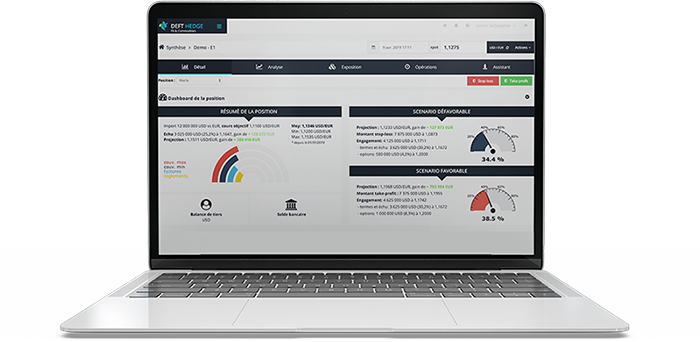IFRS Definition Standards IFRS.

In order to harmonise accounting rules between all companies listed on international markets, there are now certain accounting standards and rules common to all companies.
These common rules are now represented by the International Financial Reporting Standards (IFRS). To ensure compliance with this common reference framework, the appropriate tools must be used.
In order to support companies, whether they are VSEs, SMEs or large corporations, DeftHedge now offers management software that is perfectly designed to ensure compliance with all international accounting standards.
Taking into account and applying these financial rules enables listed companies to protect themselves against all exchange rate risks and to optimise their market investment strategies to the maximum.
Find out more about IFRS here and benefit from all the advantages of DeftHedge for your daily management.
What are the IFRS standards?
IFRS, which were introduced in 2005, reinforce and complement the former IAS (International Accounting Standards), which have been in force since 1973.
For all listed companies, these accounting rules make it possible to harmonise all the financial and accounting statements of companies internationally.
The advantage of this harmonisation of the accounting system is that it facilitates comparisons between all international companies and thus facilitates the management of transactions for these companies.
These new standards are based on various common principles :
- Focus on substance rather than form
- Balance sheet approach rather than income statement approach
- Neutrality and prudence
- Accurate valuation of assets and liabilities
- Better visibility for investors
- Harmonisation between all sectors of activity
Since 1 January 2021, 15 IFRS standards have been applied on the international markets and concern :
- Share-based payments
- Business combinations
- Insurance contracts
- Non-current assets
- Financial instruments
- Consolidated financial statements
- Partnerships
- Fair value measurement
- Rental contracts
What is the purpose of IFRS?
By creating a common financial accounting framework at the international level, IFRS fulfils various objectives:
- Simplify comparability between internationally listed companies
- Providing clear and accurate information to investors and creditors on the financial situation of companies
- Improving international competition and capital flows
- Creating a common accounting language accessible to all
The implementation of IFRS thus appears to be particularly beneficial in clarifying the accounting situation of listed companies and thus reducing risks in international financial transactions.


Who is affected by IFRS?
Applied in more than 160 jurisdictions around the world, IFRS standards allow for a broad global harmony in the accounting presentation of listed companies.
At the European level, Regulation (EC) n°1606/2002 specifies the rules of application of these standards as well as the companies concerned by these rules.
According to this regulation, IFRS standards must be applied to the consolidated accounts of listed companies. Unlisted companies have the choice of complying with IFRS or with the rules of CRC Regulation 99-02.
Concerning individual financial statements, all companies must comply with French accounting standards.
Who develops the IFRS standards?
Developed at the European Union level, IFRS standards have gradually become established on a global scale. They now play a key role in international trade as many countries have adopted these regulations.
Managed by the IFRS Foundation, these standards are evolving and adapting as best as possible to the constraints of today’s markets.
What is IFRS 9?
IFRS 9 “Financial Instruments” came into force on 1 January 2018 and replaced “IAS 39 – Financial Instruments: Recognition and Measurement”.
Like the previous standard, IFRS 9 sets out the various accounting rules to be followed for the recognition and measurement of financial assets and liabilities as well as certain contracts for the purchase or sale of non-financial items.
This new standard is divided into three phases:
Phase 1: classification and measurement
Phase 2: impairment of credit risk
Phase 3: Hedge accounting
One of the main objectives of this new standard is to strengthen the economic and accounting principles for hedging financial risks.
Imposed on companies, this standard requires an update of the various accounting and financial risk management procedures.
The advantages of DeftHedge for IFRS compliance
Compliance with international and national accounting and financial rules is essential to be able to buy and sell on the markets.
In order to meet this compliance obligation, DeftHedge supports all companies to help them on this point. In order to comply with the standards defined by the IFRS, our SaaS solution is perfectly designed to guarantee you the correct compliance with these financial rules.
In addition to meeting this obligation to take IFRS rules into account, our financial forecasting software has several functionalities that are particularly useful for your company’s day-to-day operations:
- Automation of time-consuming daily tasks
- Simulation and orientation of financial strategies
- Optimisation of market transactions
- Data centralisation and security
Much more than a simple financial management software, DeftHedge is therefore a real asset to facilitate many tasks and considerably improve your strategy on the markets.
Indeed, our software has been designed to allow companies to simulate different financial strategies in order to determine the most suitable to optimise their transactions. Soon, our software will become a must for your business and to reduce your losses during your transactions.
In order to make the most of all the functionalities of the DeftHedge software, our teams are at your side to advise you and help you in the handling of our SaaS solution. In order to always comply with the standards in force and to optimise your financial strategy as much as possible, DeftHedge proves to be a perfectly adapted solution.
Whether it is to comply with financial regulations or to determine the best strategy to adopt for your sales and purchases on the financial markets, you can trust DeftHedge.
